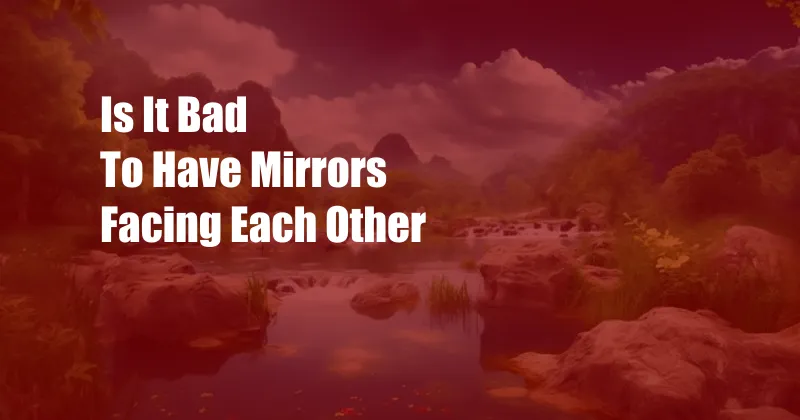
Is It Bad to Have Mirrors Facing Each Other?
The age-old question of whether it’s bad to have mirrors facing each other has been debated for centuries, with superstitions and beliefs varying across cultures. Some believe that it creates an endless reflection, trapping souls and causing misfortune, while others see it as an invitation to the spirit world or a source of good luck. In this article, we’ll delve into the history, meaning, and scientific evidence behind this intriguing topic, shedding light on the potential effects of having mirrors opposite each other.
Mirror Superstitions and Beliefs
The notion that mirrors facing each other bring bad luck is deeply rooted in ancient folklore. In Chinese culture, it’s believed that creating an “infinity mirror” by placing mirrors opposite each other can invite malevolent spirits or disturb the balance of yin and yang. Similarly, in Feng Shui, mirrors are said to reflect and amplify energy, both positive and negative, and positioning them directly opposite each other can create an imbalance.
Scientific Perspective
From a scientific standpoint, having mirrors facing each other does not pose any inherent danger or negative effects. However, it can create certain optical phenomena that may trigger psychological or physiological reactions.
Endless Reflections
When two mirrors face each other, they create an infinite regress of reflections. This can be mesmerizing to look at, but it can also disorienting or overwhelming. In some cases, it may trigger anxiety, headaches, or a sense of vertigo.
Hall of Mirrors
A more extreme example of the endless reflection effect is the “hall of mirrors” illusion. This is created when multiple mirrors are placed at specific angles, creating an environment where one’s reflection seems to extend infinitely. This illusion can be disorienting and can sometimes cause dizziness or nausea.
Sleep Disturbances
Some people believe that having mirrors facing the bed can disrupt sleep. The theory is that the reflections from the mirrors can create a sense of being watched or observed, leading to feelings of unease or anxiety. However, there is no scientific evidence to support this claim.
Expert Advice and Tips
While there is no solid evidence to suggest that having mirrors facing each other is inherently bad, there are some practical considerations and expert advice to keep in mind:
Avoid Placing Mirrors Opposite the Bed
If you find the idea of mirrors facing your bed unsettling or disruptive, it’s best to avoid this arrangement. Even if you don’t experience any issues, it’s generally recommended to keep mirrors away from the bed to create a more restful sleep environment.
Use Mirrors for Decorative Purposes
Mirrors can be beautiful decorative elements in a home. Use them to enhance the space, reflect light, or create an illusion of spaciousness. However, be mindful of where you place them and avoid creating excessive reflections that could be disorienting or overwhelming.
FAQs on Mirrors Facing Each Other
Q: Can having mirrors facing each other trap souls?
A: There is no scientific evidence or any logical reason to believe that mirrors can trap souls.
Q: Does it cause bad luck if a mirror breaks?
A: Breaking a mirror is considered bad luck in some cultures, but this is a superstition with no basis in reality.
Q: Can mirrors facing the door reflect negative energy into the home?
A: Mirrors do not have the ability to reflect or absorb negative energy. They simply reflect light and images.
Q: Is it true that parallel mirrors can create a time loop?
A: Parallel mirrors facing each other do not create a time loop or any time-bending effects.
Conclusion
Having mirrors facing each other is not inherently bad or dangerous. However, it can create certain optical phenomena that may trigger psychological reactions in some individuals. By understanding the history, meaning, and scientific evidence behind this topic, we can make informed decisions about the placement of mirrors in our homes and living spaces. Whether you choose to embrace the superstitions or focus on the practical considerations, the ultimate choice is yours.
Are you interested in learning more about the fascinating world of mirrors and their role in our lives?